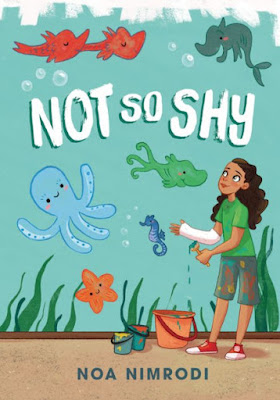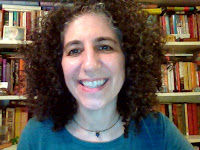Review: Not So Shy
Not So Shy
by Noa Nimrodi
Kar-Ben Publishing (imprint of Lerner Publishing Group), 2023
Category: Middle Grade
Reviewer: Heidi Rabinowitz
Buy at Bookshop.org
Twelve-year-old Shai (pronounced "shy") relocates with her family from Israel to California so that her Abba can pursue a job opportunity in a science lab developing GMO non-browning avocados. She thoroughly resents the move and resists making new friends, but ends up creating strong relationships with Korean American neighbor Kay-Lee, white non-Jewish cute geek Chris, and Muslim Hakim. After a rocky start, when Hakim assumes that an Israeli will automatically dislike him, the two realize that Shai's Iraqi-Jewish heritage bears similarities to Hakim's family background. Together, they work on science projects, deepen their friendship, and face Islamophobic and antisemitic bullying at school. Shai and her family bond with Kay-Lee's family and find ways to support each other.
Shai misses her Saba and Savta deeply. When Savta, back in Israel, is injured and comatose after a terrorist bombing, Shai gets Hakim's mom to translate Savta's old diary from Arabic so that she can feel closer to her grandmother. Shai's family visits Israel, Savta recovers, and Shai learns that "the heart is big enough to have more than one place to call home."
It must be noted that the Iraqi-Jewish experience described here may not be typical. A sensitivity reader of that background told me that while the historical facts are accurate, Savta’s portrayal is quite Ashkenazified. This could be plausible for a Jewish girl who moved from Iraq to Israel at the age of 9, but the reader personally couldn’t relate to Savta as an Iraqi grandmother, so perhaps she should not be seen as representative of the general Iraqi-Jewish experience. We definitely need more positive depictions of Israelis and Mizrahi Jews in children's literature. It is to be hoped that the next such depiction will help readers learn more details about the general Mizrahi experience.
Coincidentally, the story is quite similar in structure to National Book Award finalist Maizy Chen's Last Chance by Lisa Yee, a story of relocation, growing connection with heritage, and expansion of the definition of "home." These two titles would make good "read alikes," as both books are emotionally relatable and help readers ponder issues of prejudice and allyship.
Twelve-year-old Shai (pronounced "shy") relocates with her family from Israel to California so that her Abba can pursue a job opportunity in a science lab developing GMO non-browning avocados. She thoroughly resents the move and resists making new friends, but ends up creating strong relationships with Korean American neighbor Kay-Lee, white non-Jewish cute geek Chris, and Muslim Hakim. After a rocky start, when Hakim assumes that an Israeli will automatically dislike him, the two realize that Shai's Iraqi-Jewish heritage bears similarities to Hakim's family background. Together, they work on science projects, deepen their friendship, and face Islamophobic and antisemitic bullying at school. Shai and her family bond with Kay-Lee's family and find ways to support each other.
Shai misses her Saba and Savta deeply. When Savta, back in Israel, is injured and comatose after a terrorist bombing, Shai gets Hakim's mom to translate Savta's old diary from Arabic so that she can feel closer to her grandmother. Shai's family visits Israel, Savta recovers, and Shai learns that "the heart is big enough to have more than one place to call home."
It must be noted that the Iraqi-Jewish experience described here may not be typical. A sensitivity reader of that background told me that while the historical facts are accurate, Savta’s portrayal is quite Ashkenazified. This could be plausible for a Jewish girl who moved from Iraq to Israel at the age of 9, but the reader personally couldn’t relate to Savta as an Iraqi grandmother, so perhaps she should not be seen as representative of the general Iraqi-Jewish experience. We definitely need more positive depictions of Israelis and Mizrahi Jews in children's literature. It is to be hoped that the next such depiction will help readers learn more details about the general Mizrahi experience.
Coincidentally, the story is quite similar in structure to National Book Award finalist Maizy Chen's Last Chance by Lisa Yee, a story of relocation, growing connection with heritage, and expansion of the definition of "home." These two titles would make good "read alikes," as both books are emotionally relatable and help readers ponder issues of prejudice and allyship.
Are you interested in reviewing books for The Sydney Taylor Shmooze? Click here!
Reviewer Heidi Rabinowitz is one of the co-admins of The Sydney Taylor Shmooze, along with Susan Kusel and Chava Pinchuck. She hosts The Book of Life Podcast: A Show About Jewish Kidlit (Mostly) at bookoflifepodcast.com. Heidi is Past President of the Association of Jewish Libraries, and Library Director at Congregation B'nai Israel of Boca Raton, Florida.


Comments
Post a Comment